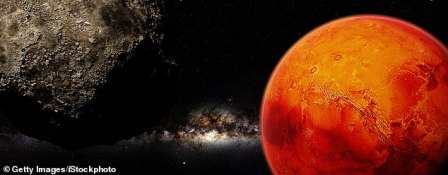Scientists have readjusted the timeline of the formative years on Mars and claim the red planet could have been home to life before Earth was habitable, according to Daily Mail.
A study has tweaked the timings of when the cratered surface stopped being bombarded with meteorites and says life may have developed between 4.2 billion and 3.5 billion years ago.
This, the authors claim, predates when Earth became a thriving oasis by around 500 million years.
The planets formed, as did most of the interior solar system, around 4.5 billion years ago and it was a chaotic environment filled with impacts and meteors ad the planets continued to form and grow.
Eventually, the solar system’s disarray calmed down and the impacts of the so-called Late Heavy Bombardment ceased.
This then gave birth to a calmer period around 4.48 billion years ago, when giant, life-inhibiting meteorites stopped striking the red planet and gave Mars its first ‘real chance’ at developing life.
The end of the Late Heavy Bombardment has been heavily debated but a team at Western University studied the oldest-known mineral grains from meteorites that are believed to have originated from Mars’ southern highlands
They were once part of Mars but knocked into space during a violent collision and landing on Earth. There are around 120 known samples in the world.
They studied them at a near-atomic level and were able to get a snapshot of what the Martian surface was like billions of years ago.
Dr Desmond Moser found the oldest minerals in these rocks, zircon and baddeleyite, date back between 4.43 and 4.48 billion years old.
They also didn’t exhibited the telltale signs of huge meteor impacts, such as high temperatures and pressures. This indicates they were formed after the bombardment ceased.
It was dated using the slow decay of uranium into lead in the samples, which can be mapped to give an accurate idea of its true age.
‘We found none of these bombardment signatures in the Mars zircon and baddeleyite grains,’ Dr Moser said.
‘We know there was a giant impact on Mars, but it has to be older than 4.48 billion years ago.
‘The implication is that there could have been platform hosting life as much as half a billion years earlier than previously thought it was possible in the inner solar system.’
It is believed the huge event, now pushed back further into Mars’s infancy, may have helped lay the platform to create habitable conditions.
‘Giant meteorite impacts on Mars between 4.2 and 3.5 billion years ago may have actually accelerated the release of early waters from the interior of the planet setting the stage for life-forming reactions,’ Dr Moser said in a statement.
‘This work may point out good places to get samples returned from Mars.’
N.H.Kh

